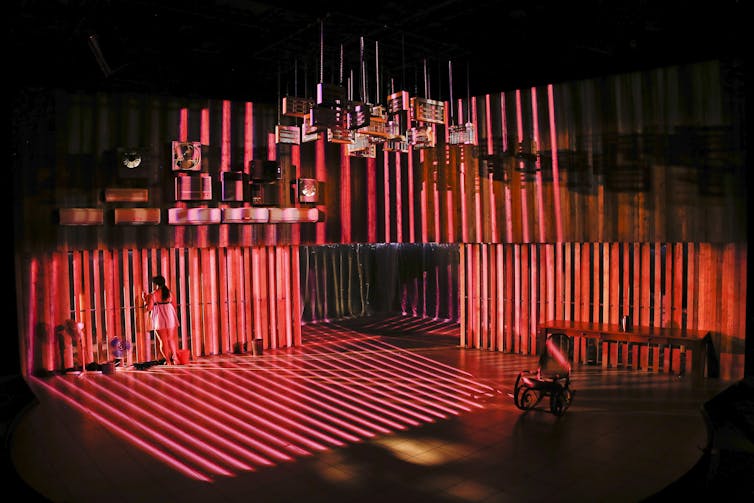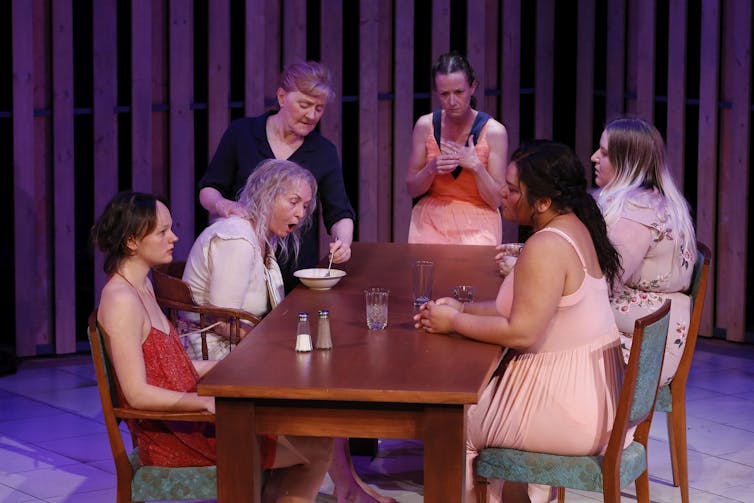The House of Bernada Alba is an extraordinary portrait of imposed silence and female misogyny
- Written by Ana Puchau de Lecea, PhD Candidate and Teaching Associate, University of Melbourne
Review: The House of Bernada Alba, Arts Centre Melbourne.
Could a Spanish rural drama written in the 1930s still be relevant in 2018 Australia? In their production of Federico García Lorca’s The House of Bernarda Alba, director Leticia Cáceres and playwright Patricia Cornelius show us that it can.
Lorca’s play tackles the struggle between oppression and the desire for freedom, paying particular attention to the invisible ways in which women are harmed. Lorca set the play in a specific yet indefinite time and place, which allows it to be transferred anywhere.
Lorca (1989-1936) was murdered in the outbreak of the Spanish Civil War (1936-1939) by a Nationalist firing-squad, only months after he’d finished writing the play, which he was never able to see on stage. In it, Lorca criticised the complicit silence around violence towards women - the same retrograde conservatism that would end his life. He even seemed to foresee the long dictatorship that would oppress Spanish women and men starting in 1939.
In the play, after the death of her second husband, Bernarda subjects her five daughters to eight years of rigorous mourning in which “no breath of air is going to get into this house.” In Cornelius’s contemporary adaptation, Bernarda is Bernadette; the five daughters are now four; and the time of confinement at home is eight weeks. Without internet.
In her opening monologue, the housekeeper Penelope (Julie Forsyth) informs the audience that after the patriarch’s death, Bernadette (Melita Jurisic) is left with no money and “stuck with four ugly girls”: Angela (Peta Brady), Marti (Candy Bowers), Magda (Bessie Holland) and Adele (Emily Milledge). Bernadette has also locked up her senile mother, Maria (Sue Jones), who dreams of escaping and getting married.
Attached to the walls, numerous air conditioners warn of the suffocating summer ahead in rural Western Australia. Hanging from the ceiling, several mosquito zappers betray the bugs that circumvent the window screens - and Bernadette’s ruthless control measures. The absence of a male figure does not prevent the women from being subjected to a repressive patriarchal system. Bernadette embodies the tyranny of a misogynist woman.
 Candy Bowers as Marti.
Jeff Busby
Candy Bowers as Marti.
Jeff Busby
Suffering from poor health, 39-year-old Angela is the only heiress to the family’s fortune, which leads to other deeply human themes: envy, social injustice, hypocrisy. A young man, Peter Romano, shows a sudden interest in Angela, raising both suspicion and repressed passion among her siblings.
Like the rest of the male characters, Peter is talked about but never appears on stage. Men belong on the outside. The external voices of Lorca’s wheat reapers singing on their way to work are now noisy miners who are free to drink beer and gamble at the pub. Stories of the women’s sexual defencelessness at the hands of generations of abusive men show that women aren’t allowed the same freedoms. After all, as Adele laments, “Men get away with everything”.
Despite this, men are inevitably present inside Bernadette’s house: in the sisters’ conversations, in Penelope’s retelling of external gossip, in the urn with the ashes of their father, symbolically witnessing their actions.
The matriarch’s obsession and mission is to protect the decency of her daughters (and the reputation of her family name), even if that means confining them to living in what Cornelius describes as a “bunker”. This imposition of silence and repressive behaviour impedes Bernadette from seeing the approaching tragedy. “When it comes to your children you’re blind,” forewarns Penelope.
The characters’ experiences intertwine in the stifling setting of the household. As the weeks go by, the heat and tension escalate, due largely to the daughters’ sexual repression. Adele, the youngest, claims her right to go out and is especially sensitive to the invasion of her own, individual space. For different reasons, the four sisters are characters in pain condemned to a life between four walls, unable to establish healthy relationships with the outside - or even themselves.
 Emily Milledge, Sue Jones, Julie Forsyth, Peta Brady, Bessie Holland, Candy Bowers.
Jeff Busby
Emily Milledge, Sue Jones, Julie Forsyth, Peta Brady, Bessie Holland, Candy Bowers.
Jeff Busby
Marg Horwell and Rachel Burke’s austere set and lighting design evoke a prison. The main stage and the back hallway are separated by bars and sliding doors, contributing to this effect. When the lights emulate sunset or sunrise, elongated bar shadows are projected onto the stage floor. Irine Vela and Jethro Woodward’s sound design dramatically accompanies the different phases of confinement.
Cornelius and Cáceres succeed in bringing Lorca to a contemporary Australian context by taking his universal message and filling it with ordinary, relatable situations and conflicts. Cornelius maintains Lorca’s original structure, reworking it with references to popular culture: instead of sewing, the characters read gossip magazines filled with plastic surgery makeovers and superficiality. Moreover, intertwined with the inheritance conflict, the play subtly alludes to the Indigenous dispossession of their lands.
The cast is extraordinary. The performances are nuanced and complex, providing reasons to understand the characters even in their most questionable actions. Forsyth engages with the audience from beginning to end, and Milledge’s Adele is unforgettable.
The House of Bernarda Alba is a shocking play filled with symbolically loaded poetry. As a queer man, Lorca knew the torture of imposed silence too well. In his representation of domestic dictatorship, Bernarda’s first and last word in the play is “silence,” highlighting her intransigence and abuse of power. This is precisely the starting point of Cornelius’s evocative exploration of gender and power in the 21st century. And it is more timely than ever.
The House of Bernarda Alba is now on at the Arts Centre, Melbourne until July 7.
Authors: Ana Puchau de Lecea, PhD Candidate and Teaching Associate, University of Melbourne





